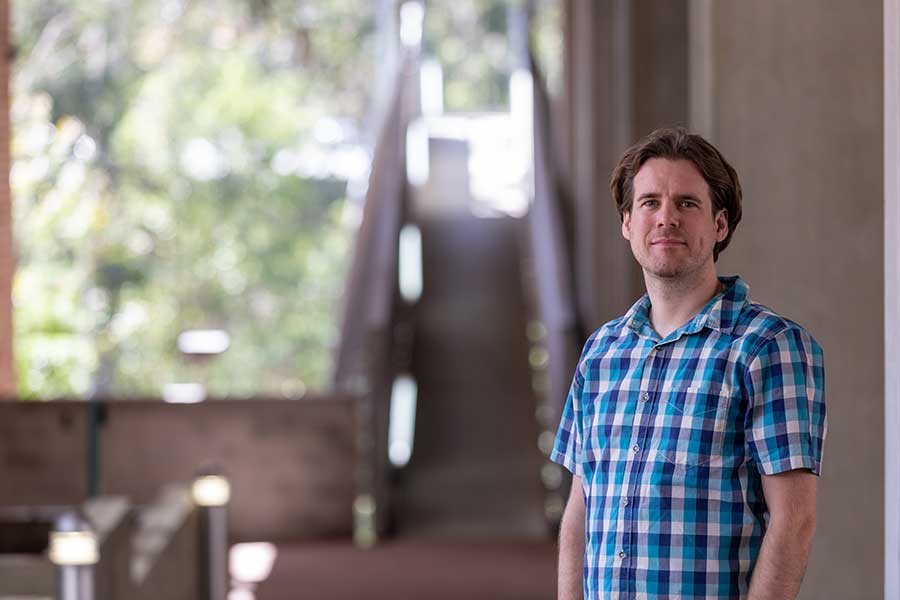Researcher Highlights
Getting evidence into the right hands
Once research is completed, Dr Steven Maltby’s work helps to ensure it is communicated effectively to the right people—boosting reach, interest and impact.

After many years in basic research focussed on understanding immune responses, Dr Steven Maltby has recently switched his focus to communicating research findings after discovery.
After all, he reasons, evidence that sits on a dusty shelf has little effect on lives or progress. Drawing on his health research expertise, Steven is now investigating how results can be better communicated to create the greatest impact for specific audiences. For example, improving clinical care for patients or developing new training resources for students.
“Beyond performing research, it’s very important for academics to communicate new knowledge in a language and format that suits the target audience,” says Steven.
“These audiences may be quite diverse, including other researchers and clinicians, students and teaching staff and the general public.”
“My work seeks to make new knowledge and data accessible and more broadly available.”
It starts with research
Steven moved from Canada to Australia in 2012, joining the University of Newcastle’s research community as a postdoctoral research fellow supervised by Laureate Professor Paul Foster. At the time, Steven’s research focused on understanding how bone marrow function changes in response to disease and infection.
“The aim of my studies was to characterise what happens when a virus is first detected by the immune system, including systemic changes in the bone marrow.”
“The bone marrow houses immune cell progenitors that give rise to mature immune cells, as well as structural cells that are important for maintaining mineral bone. The immune response to disease often causes a lot of the damage and pathology.”
Building on understandings gained from Steven’s early research into immune responses, he transitioned into more clinical research to improve treatment of lung disease, especially severe asthma from 2015. By facilitating improved communication of evidence, Steven has given patients and clinicians increased access to the best evidence from which to base treatment decisions.
“My past research focused on understanding how immune responses occur in the body. Building on this, I applied knowledge to the development of technologies for teaching and training, including the Severe Asthma Toolkit, which was developed for clinicians. I managed project development of this resource in my role with The University of Newcastle’s Centre of Excellence in Severe Asthma.”
Disseminating the results
Steven’s approach to best-practice communication has three main steps.
First, identity high-quality knowledge and evidence that needs to be communicated. Second, translate the evidence in a way that will be meaningful for the target audience. Finally, present the information in a way that is useful, accessible, efficient and engaging. Steven acknowledges that this process is not always straight-forward.
“People are constantly bombarded with information and are very time-poor. So, a major challenge is identifying and packaging information in a way that can be readily accessed, and then getting it into the hands of the target audience in a way that they will engage with.”
As a project officer for the University’s Advanced Training Systems group (since 2019) and the Centre of Excellence in Severe Asthma, Steven’s work contributes to the development of several innovative communication resources for academics, professionals and public audiences.
“The communication takes many forms. We’ve created website and social media content and used technologies such as mixed reality (XR), virtual reality (VR), augmented reality (AR) and 360-degree video to communicate the evidence in a way that is practical, tailored and engaging for our audiences.”
“Our work is tailored for a variety of settings. For example, within a university, it supports the development and delivery of efficient and engaging teaching approaches to support understanding of subject matter and the development of practical skills.”
Supporting evidence-based decisions
The Severe Asthma Toolkit is one of Steven’s most recent projects. Working as project manager, in partnership with the Centre of Excellence in Severe Asthma, Steven’s goal was to create a comprehensive asthma resource for clinicians in public and private clinic settings.
“The Severe Asthma Toolkit is a web-based resource that was launched in March 2018 and has now been accessed by more than 20,000 users from over 150 countries. Its aim is to improve people’s understanding of severe asthma and management of the disease.
“Like our other projects, this work is really about presenting data to people in a way that can be understood and is freely accessible, so that research dissemination can happen effectively.”
Steven’s work continues to include a strong research component. His team are always investigating the best designs and approaches for teaching and learning resources. The hope, he says, is to support more individuals to lead more informed lives and make evidence-based decisions.
“I believe it is important that every audience has access the information they need, in a format that suits them, to inform evidence-based decision making. A clear understanding of evidence is required to address any of the major problems that society faces.”
The University of Newcastle acknowledges the traditional custodians of the lands within our footprint areas: Awabakal, Darkinjung, Biripai, Worimi, Wonnarua, and Eora Nations. We also pay respect to the wisdom of our Elders past and present.
